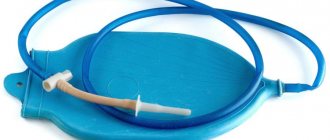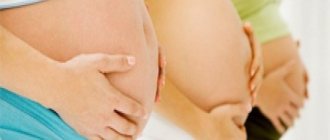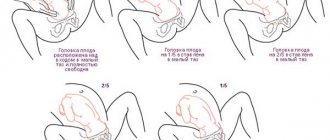Cleansing the body before childbirth - important tips
Greetings to all blog readers!
Health and well-being are what every person strives for. But these concepts take on special meaning when a woman is expecting a baby. During this period, it is important to choose your diet especially carefully.
Since the body is polluted most often because we eat junk food, we can get rid of waste and toxins if we make adjustments to the menu and take some simple and harmless procedures.
How to do this so as not to cause harm to the mother and child, but to benefit, we’ll talk in today’s article.
Information about preparing for childbirth
The highest concentration of harmful substances comes from food. An incorrect diet provokes heartburn, gas, belching, a feeling of heaviness and other uncomfortable symptoms.
If the situation is more advanced, then periodically there are pains in the abdomen and stomach, bad breath occurs, and rashes appear on the skin.
In order to prevent the development of diseases, the expectant mother should take care of the cleanliness of her body, especially since the baby’s condition depends on this.
This will help solve other problems that pregnant women often experience: nausea, irregular bowel movements, fatigue and headaches.
Colon cleansing methods will help eliminate discomfort at home.
It is very important throughout the gestation period, and especially before childbirth, to monitor how the gastrointestinal tract functions.
Constipation increases intra-abdominal pressure, and since there is a fetus in the uterus that increases it, this can cause rectal prolapse or hemorrhoids.
Therefore, if there are problems with defecation, then such procedures are necessary. Whether you can use this or that traditional method, you should consult with your doctor.
For the most part, doctors welcome this method, because with the help of natural products the most gentle cleansing is carried out: the intestinal microflora is preserved, and all toxins and impurities are eliminated.
Some people experience nausea, diarrhea, loose stools and increased urination in the last days of pregnancy. This is due to the fact that the fetus descends and the pressure on the intestines and bladder increases.
As people say, the body cleanses itself before childbirth, preparing for the process of childbirth in a natural way.
In order for this process to be more gentle and not cause unpleasant sensations, you should constantly take care of its cleanliness. And for this, time-tested folk methods will help you.
Methodology and tips
Do you need cleansing of the body before childbirth, and what kind of cleansing is it better to consult with your doctor.
But throughout the entire period of gestation, you can use natural products that will effectively cleanse the intestinal walls of feces, waste, and remove toxins.
This will only improve the woman’s well-being, and this will have a positive effect on the development of the baby.
So, here are some simple but very effective recipes.
- Cleansing with kefir and oil.
This method preserves beneficial microflora in the intestines, enriches it with bifidobacteria, having a beneficial effect. In the evening, add a tablespoon of olive oil to a glass of kefir and drink before bed.
Oatmeal, which contains a lot of vital microelements and has a mild laxative effect.
Pamper yourself several times a week with such a breakfast so that your gastrointestinal tract functions smoothly. Pour half a glass of oatmeal with water, one glass, bring to a boil, remove from heat and wrap so that the flakes brew and swell. After 20 minutes, add a handful of cashews and 1 tbsp. lie honey.
Flax seeds - they contain omega-3 fatty acids, which simulate cell regeneration, hair and nail growth, and mildly weakens.
Try eating 1 teaspoon half an hour before breakfast for a month. seeds with a glass of water. If a woman notices a tendency to constipation, then sometimes, 2-3 times a week, vegetable salad can be flavored with flaxseed meal as a seasoning.
Dried fruits - raisins, prunes and dried apricots have a mild laxative property, but their most important advantage is that they contain a large amount of vitamins and minerals that are necessary for the expectant mother and baby.
They have the ability to activate intestinal peristalsis, which perfectly helps remove all debris from the gastrointestinal tract and fights constipation.
Take 200 grams of each dried fruit, the same amount of lemon (which must first be thoroughly washed and the seeds removed). Grind all the ingredients in a meat grinder, add a glass of honey and stir.
Store the resulting mass in the refrigerator, consume a tablespoon half an hour before meals, three times a day.
Preventive measures
As you can see, all the recipes are tasty and healthy. To avoid health problems during pregnancy, you should take care of your health before conception.
It's good to rid your body of parasites. There are various medications, but they have a strong effect, which often causes severe uncomfortable side effects.
A milder effect can be achieved using traditional methods: for example, wormwood. This method is used before conception.
Grind the dry herb into powder using a coffee grinder and take a pinch before meals with a glass of water or milk. Don’t forget to wash the coffee grinder immediately after use so that the bitterness does not set in.
The course is 2 weeks, but this method is good until the moment of conception, since this bitter herb can negatively affect the unborn baby.
When you are planning to have a child, changing your diet will help you improve your health. A raw food diet, or as it is also called, living nutrition, can radically change your well-being and health in 40 days: vital energy appears, sleep is normalized, and diseases are cured.
It is important to switch to this diet correctly so as not to provoke complications and avoid breakdowns. Professionals will help you do this correctly and provide you with all the necessary knowledge.
Become a participant in excellent raw food courses that will give you the opportunity to feel the beneficial effects of changing your menu completely free of charge.
You will learn all the secrets and get delicious and healthy recipes with which your diet will remain varied and healthy, and at the same time heal.
How many days you can feel the changes is individual, but everyone notices a surge of energy and improved well-being within the first two weeks. Such a diet does not mean tasteless, bland dishes.
You can see this for yourself - look at the range of raw food products and sweets in this store for raw foodists and vegans.
Here you will find your favorite delicacies, as well as nuts, herbs and spices, with which you can prepare any raw food dish yourself. The store has excellent, powerful equipment that will take a minimum of time to prepare live dishes.
The birth of a new life is a great reason to radically change your life. Change begins with a more sensitive and caring attitude towards yourself.
You try to eat healthier, give up bad habits - these steps alone provide a huge bonus for your well-being. Try to spend more time outdoors, move, and spend less time at the computer or TV.
Instead of taking public transport, walk a few stops. Such walks every day will saturate the blood with oxygen, and every cell will receive what it needs.
Moderate physical activity during pregnancy has a beneficial effect on both the expectant mother and the fetus: it improves metabolism, saturates with oxygen, improves the functioning of the cardiovascular system and internal organs.
Daily walks in areas remote from industrial enterprises and busy roads should become a mandatory daily ritual.
These simple methods will help you get through the period of waiting for your baby to be born without problems from the gastrointestinal tract. Natural products will improve digestion and become a source of nutrients.
Share these recipes with your family and friends by posting this page on your wall on social networks.
Such recipes will be useful for everyone, and by subscribing to blog updates, you will receive new interesting information.
friends, I wish you all health and happiness!
Source: https://zdorovee-vseh.ru/lechebnoe-golodanie/chistka-organizma/pered-rodami.html
How to fight
Of course, when the body is cleansed, the woman has unpleasant sensations, because she is tied to the toilet. But there is no need to get rid of loose stools as a harbinger of labor. To increase the interval between bowel movements, you just need to eat fastening foods, and also temporarily give up red and orange foods.
It is worth fighting diarrhea if the cause of the disorder is poisoning. Then the stool turns green or yellow, and the expectant mother’s temperature rises. This situation cannot be left without the attention of a doctor.
It is necessary to eliminate diarrhea if it is foamy, has a strong smell of rot, or consists of mucus. But when cleansing the body begins before childbirth, nothing like this is observed. After delivery, the disorder will go away if it is caused by this. It is quite possible that diarrhea will not appear at all and this is also considered normal.
Mothers in labor worry about defecation during the birth process. Colon cleansing begins only in those women who suffered from constipation instead of a disorder a few days before the event. To prevent this from happening, you should help your body get rid of feces. In the maternity hospital, the intestines are cleansed with a light enema. Then you won’t have to worry about trouble in the delivery room.
It is believed that the body is cleansed before childbirth for most women in labor. The main thing is that the cause of the disorder is the approaching birth of the child, and not food poisoning. In order not to miss the disease, you should report all changes in your condition to your personal obstetrician. Then complications can be avoided.
If diarrhea began as a harbinger of the birth process, it will go away on its own immediately after the baby is born. In the absence of natural bowel cleansing, it is necessary to do an enema to remove feces. After mechanical cleansing, there is no need to worry about bowel movements occurring during pushing.
A woman prepares for childbirth for the entire 9 months she carries her baby under her heart. But when the moment of birth is about to arrive, and contractions begin, there is one procedure that gynecologists and women in labor themselves are arguing about today. This is an enema before childbirth.
As a result of the research, administering an enema before childbirth is not a mandatory procedure today. Whether an enema is given before childbirth in the place where you are planning to give birth, you need to check directly with the head of the maternity hospital. Perhaps, if you are a supporter of this procedure, you will need to additionally agree on its implementation or, on the contrary, issue a refusal.
How many days before giving birth does the intestines cleanse?
I found this information on the Internet. I have exactly exactly what is written here... I can only hope that this cleansing won’t last long and I’ll give birth soon.
You've probably already heard that diarrhea before childbirth is a common occurrence and torments many? Yes, indeed, this is so.
Loose stools before childbirth may appear a couple of weeks before the event itself, or it may begin literally the day before.
This is due to the lowering of the baby’s head into the small pelvis; it puts pressure on the sacral plexus, causing terrible discomfort.
At the same time, you may experience frequent urination, it becomes terribly uncomfortable to sit and lie down, and sleeping is a complete torment. I can’t find a position for sleeping, everything interferes and presses me.
In first-time mothers, such symptoms appear already on https://nedeli.org/pregnancy_week_38_articles/ - https://nedeli.org/pregnancy_week_39_articles/ , during the second pregnancy they may appear on the last day or even with the onset of labor pains.
Interestingly, despite the fact that after https://nedeli.
org/the_omission_of_the_stomach_before_birth_articles/ the pressure on the diaphragm decreases and the stomach is no longer compressed, appetite does not always appear, many continue to suffer from nausea and gastrointestinal discomfort.
I don’t feel like eating at all and that’s normal. Cleansing the body before childbirth also means changing your appetite. Now you only want to eat light vegetable and dairy foods, you have again become selective in food, almost like in the early stages.
Constipation before childbirth is also possible and happens quite often, so if you do not have such symptoms, this does not mean that there is something wrong with you or that you are post-term pregnancy; labor can begin without loosening your stool.
Constipation is not very good, and therefore you need to fight it, try to eat more fresh vegetables and fruits, drink fresh kefir and monitor your daily bowel movements.
If you don’t have independent stool, you shouldn’t sit on the toilet for a long time, because you can provoke hemorrhoids.
It is completely acceptable to use suppositories with sea buckthorn or glycerin; nothing bad will come from them to you or your baby, and they will help improve bowel movements.
But loose stools before childbirth are still more common
The fact that the stool softens before childbirth is very good for both you and the baby. This is a natural phenomenon inherent in nature.
If the intestines are empty, there will be no obstacle to the baby being born, nothing in the pelvis will interfere with it.
As a rule, appetite decreases at the same time, as if the body itself refuses to waste energy on digesting food, because real contractions will begin very soon.
Diarrhea before labor does not usually mean fluid loss or dehydration. The stool is only softened to a pasty state and occurs 3-4 times a day in a small volume. Of course, this is not pleasant, because you are even afraid to leave the house for a long time in case there is a bowel movement, but it does not lead to electrolyte disturbances or any serious problems.
If you have diarrhea and vomiting before childbirth, or even just very loose, frequent watery stools, mixed with green, yellow, foamy, with a bad odor, or even a fever, you should not attribute such a phenomenon to childbirth, intestinal infections and Pregnant women are not insured against poisoning. Perhaps you are sick and then it can be dangerous - call a doctor.
Liquefaction of the stool before childbirth may be accompanied by cramps in the abdomen, a feeling that the stomach is twisting, and tormented by gas.
The uterus is very susceptible to such anxiety and can also constantly become toned, there may be https://nedeli.org/false_contractions_during_pregnancy_articles/.
As a rule, in such cases, all this does not last very long, 1-2 days, bowel cleansing ends and active labor begins.
When entering the maternity hospital, be sure to tell us about bowel movements and how long ago your diarrhea began. Natural cleansing of the body will save you from such dubious joy of prenatal preparation as https://nedeli.org/enema_before_birth_articles/, because in such cases there is no point in doing it, the intestinal cleansing took place on its own.
In general, if you feel weak, it’s not a big deal. Just keep an eye on the following:
- The stool should not be profuse and very liquid
— Intestinal upset before childbirth is not accompanied by a disturbance in the general condition. There is no fever, weakness, headache, muscle cramps or other symptoms, no vomiting or nausea, no thirst
— The body is cleansed no more than 3-4 times a day
If you have additional symptoms other than loose stools, you should consult a doctor, because the cause may be an infectious disease.
Source: https://healthislife.ru/beremennost/za-skolko-dnej-do-rodov-ochishhaetsya-kishechnik.html
Causes, norms and timing
Cleaning before childbirth is caused by the lowering of the fetal head into the pelvis. The baby begins to put pressure on the sacrum. Along with back discomfort, other warning signs of labor appear, such as loose stools and frequent urination. After the head drops, the expectant mother cannot find a comfortable position for sleeping. Sitting and lying also become unbearable.
How many days before birth does the intestines begin to cleanse?
In firstborns, this symptom appears at 39 weeks; during a second pregnancy, the messenger comes only on the eve of the birth process, and sometimes during the period of contractions. When cleansing occurs before childbirth, it will be easier for a woman to survive childbirth. If there is nothing in the intestines, nothing interferes, the baby will be born. During cleansing, the body does not lose fluid and does not become dehydrated.
Normally, the stool becomes softer and 3-4 bowel movements occur per day. In addition to the fact that you often want to go to the toilet in a big way before giving birth, a number of other symptoms appear that indicate an imminent delivery. These are expected changes in the functioning of the entire body of a pregnant woman.
How the body behaves before childbirth:
- frequent bowel movements occur;
- stomach twists;
- gases accumulate;
- the uterus constantly becomes toned;
- Training contractions intensify.
Symptoms of cleansing the body before childbirth last no more than 2 days, and then change to full-fledged labor. Upon admission to the maternity hospital, you must immediately report the presence or absence of bowel movements.
Cleansing the body before childbirth: how many days does it take for the intestines to clear, do I need to take a laxative?
1–2 weeks before birth, the fetus in the womb takes a comfortable position for exiting the uterus. Its head descends closer to the pharynx, the uterus moves from the abdominal cavity into the pelvic cavity. All this creates additional pressure on nearby organs.
Primiparas often perceive a sign of imminent labor as a consequence of food poisoning, but natural cleansing is not accompanied by symptoms such as nausea, vomiting or deterioration of health.
Diarrhea before childbirth is not a mandatory phenomenon, but an individual reaction that occurs in many pregnant women, but not in all. For some, on the contrary, constipation may occur or the nature of bowel movements will remain the same.
The opinions of modern obstetricians and gynecologists about whether an enema should be done before childbirth or not are divided. In domestic obstetric practice, for many decades it has been customary to artificially cleanse the intestines of women in labor before sending them to the delivery room. Western colleagues consider this procedure unnecessary, which is why they began to refuse enemas in our maternity hospitals.
Arguments in favor of an enema:
- Many women suffer injuries and ruptures during childbirth and have to undergo stitches. Going to the toilet and pushing after delivery can be quite painful. An enema will help solve the problem of bowel movements for the next 1–2 days.
- Hardened feces put pressure on the uterus and prevent the fetus from passing through the birth canal. If a woman in labor suffered from constipation in the third trimester, she needs to cleanse her intestines.
- During childbirth, a woman strains, resulting in involuntary bowel movements if feces are present in the intestines.
- The thought of accidentally defecating takes a toll on a woman's emotional comfort.
Opponents of enemas argue that the body cleanses itself before childbirth. An empty intestine, on the contrary, can weaken labor, so you should not interfere. In addition, in the second stage of labor, defecation is inevitable, and after an enema, liquid feces are often released in the form of splashes.
A woman should check with the maternity hospital in advance whether they do an enema or not. Depending on the answer, you can choose another institution or cleanse the intestines in advance with microenemas suitable for pregnant women.
How to prepare for childbirth by cleansing the intestines?
During delivery, pushing may cause involuntary bowel movements in the delivery room. If several decades ago an enema in the maternity hospital was considered a mandatory procedure, now many obstetricians refuse to do it, considering such cleansing of the body to be useless. However, many women find it psychologically more comfortable to give birth, knowing that no unpleasant incidents will happen to them.
Laxatives should be taken with caution during pregnancy. They increase muscle tone, cause contraction of the intestinal muscles and, as a result, can provoke premature birth. Before using laxatives, you should consult your doctor.
| No. | Name | Active substance | Release form |
| 1 | Dulcolax | Bisacodyl | Tablets, suppositories |
| 2 | Regulax | Senna | Pills |
| 3 | Guttalax | Sodium picosulfate | Tablets, drops for oral administration |
| 4 | Duphalac | Lactulose | Syrup |
| 5 | Forlax | Macrogol | Powder for preparing solution |
| 6 | Microlax | Sodium citrate, sorbitol | Microclysters |
To enhance peristalsis and cleanse the intestines before childbirth, instead of suppositories and microenemas, you can use folk recipes:
- Dried fruit mixture. To prepare, you will need 200 g of chopped raisins, dried apricots, and prunes. The ingredients are mixed and 300 g of honey is poured. Take 1 spoon three times a day.
- Cleansing with fermented milk products. Add a tablespoon of olive oil to a glass of kefir and drink it before bed. Kefir not only helps with constipation, but also saturates the colon with beneficial microorganisms.
- Castor oil has laxative properties. It has a specific taste, so it is difficult to drink it in its pure form without gagging. A tablespoon of castor oil is usually added to a glass of orange or grapefruit juice.
In the last weeks before giving birth, you should pay special attention to your diet. Some products have a strengthening effect, so you should avoid them:
- rice;
- bananas;
- potato;
- flour products;
- fatty, fried foods;
- fast food.
An enema is necessary if there are several days left before the birth, and self-cleansing does not occur. It must be placed before labor begins, while the cervix is not dilated.
If labor has already begun, an enema cannot be done. Usually the procedure is performed in maternity hospitals, but if a woman is shy and feels more comfortable cleansing the body on her own, she can do it at home.
To do this, you will need an Esmarch mug, which can be bought at any pharmacy.
Stages of the procedure:
- The container is filled with warm water - about 37°C, so that the liquid is close to the temperature of the human body.
- A water tank is suspended at a height of 1–1.5 m next to the couch where the woman in labor will lie.
- For a soft and painless insertion, the tip is lubricated with lubricant or baby cream.
- The woman takes a comfortable pose. It is best to lie on your side or get on all fours.
- At the moment of filling the intestines with water, you need to relax, breathe deeply and stroke your stomach.
- When the water fills the colon, you need to wait 10-15 minutes, holding back the urge to go to the toilet, and only then go to the restroom.
You may also like
Source: https://gig-games.ru/skolko-dney-rodov-ochishchaetsya-kishechnik/
Enema in the maternity hospital
The question of an enema often arises among women who are giving birth for the first time. For some reason, they are the ones who try in every possible way to avoid the procedure of intestinal cleansing. Experienced ladies, without hesitation, do an enema before childbirth, so as not to worry about anything and fully concentrate on the birth process.
An enema is an absolutely painless procedure; with its help, the abdominal organs are filled with warm water. And then there is a complete cleansing before childbirth. In the maternity hospital, the enema is given by a nurse at the initial stage of labor. When a woman enters the maternity ward, she puts on a special gown and is taken to the treatment room, where she is given an enema. However, if the cervix has already dilated well and contractions have become more frequent, then cleansing the rectum is completely abandoned.
How many days before birth does diarrhea and bowel movements begin?
Many women, expecting the birth of a child, are afraid of... no, not pain. No, not contractions and pushing. They experience an inexplicable horror of a cleansing enema.
And if for our mothers this was in the order of things, then the presence of this delicate procedure on the list of mandatory ones in some modern maternity hospitals sometimes forces a woman to even change this same maternity hospital. Well, or tearfully beg the doctor to handle it on your own. Fortunately, gentle medications, micro-enemas and other ways to cleanse the intestines on the eve of childbirth are now quite common.
However, there are also expectant mothers who may also ask for this very enema. After all, you don’t want to disgrace yourself at the most crucial moment, although then the woman doesn’t really care...
And only a few percent were “lucky”: their body took care of everything itself, solving the problem with a common gastrointestinal disorder. In addition to a very useful function, this can also be regarded as a harbinger of labor.
And all worries about “it’s inconvenient” and “are there any side effects of medicinal laxatives” disappear by themselves...
Diarrhea: how many days before delivery?
If a woman is not armed with such theoretical knowledge, then, having frequented the toilet, she may well “sin” for poisoning . And given the somewhat “interesting” gastronomic preferences of pregnant women, this option should not be ruled out.
But poisoning is rarely accompanied only by diarrhea. What about nausea, stomach pain or lower abdominal cramps? Fever and feeling unwell? If all this is not observed, then we can assume that a planned bowel cleansing .
But don’t expect that you’ll give birth today or tomorrow! Yes, the baby’s head has begun to descend into the pelvis, pressing on the sacrum, which provokes unpleasant sensations.
The latter borders on the urge to go to the toilet, a feeling of constant pressure on the anus and loss of appetite.
In primiparous women, similar symptoms can be observed at 37-39 weeks; in multiparous women , this is regarded as a real harbinger of the imminent onset of labor.
Nature is actively preparing the birth canal for the passage of the child, and so that the filled intestines do not interfere with it, it gets rid of everything unnecessary.
Therefore, it would be correct to inform your doctor about such nuances: it will serve as an approximate guideline for him, and you will avoid the sad fate of a voluntary-compulsory enema.
Just, just in case, do not experiment with food during this period, do not “lean” on red and orange foods and, if possible, rule out an intestinal infection.
It will be expressed in the presence of mucus, foam and a strong odor in the stool. You won't miss this.
Nausea before childbirth
Often these two symptoms “work” in tandem. Only their functions are different.
- Diarrhea is busy cleansing the body, facilitating the passage of the baby through the birth canal and creating psychological comfort for the expectant mother. After all, it’s much calmer if a woman is sure that during childbirth she won’t have to blush for an embarrassing situation. More precisely, even after childbirth, since during childbirth it is rarely possible to focus on this. And if there were other “eyewitnesses”...
- Nausea , although it accompanies labor, carries slightly different information. Especially if regular contractions have already begun. Namely: in some women, the cervix opens this way, with nausea and vomiting.
We should not forget about the physiological characteristics of the female body. After all, for some, even the onset of menstruation is accompanied by nausea, let alone the birth process.
Many pregnant women feel sick from hunger . And if she is predicted to have a possible cesarean section and is advised to refrain from eating, it is quite possible that she will begin to feel sick.
Or vice versa: the woman in labor has eaten a hearty meal, but it is difficult for the body to cope with the onset of labor and digestion of food at the same time. As a result, the body rebels, getting rid of unnecessary things.
Of course, no one says that you can’t eat on the day of birth. It’s even necessary, because a woman needs strength for hard work. But it is better to do this in advance, before entering the delivery room. And in small quantities, excluding sweets and strong allergens.
Cleansing the body
If you make sure that you are not poisoned, remember the last time you ate and rule out the side effects of the medications you took, you can say “thank you” to your caring body.
Quite suddenly, there was a kind of “change of power” in him from progesterone to estrogen , the concentration of which began to simply “go off scale.”
Pregnancy no longer needs to be maintained and preserved, the baby is ready to be born, and the body requires at least some kind of unloading.
It manifests itself in a decrease not only in appetite, but also in weight, due to the removal of excess fluid and waste products. The loss is small - 1-2 kg, but significant for facilitating the birth process.
Moreover, both diarrhea and lack of appetite are useful:
- Diarrhea removes feces, diluting them, thereby facilitating bowel movements. For an expectant mother who is often accustomed to constipation, this is a pleasant bonus before the main event.
- A poor appetite in the third trimester will prevent your baby from gaining a lot of weight. No, a large child is not bad, but it is fraught with a difficult birth. In addition, moderate numbers on the scales also wouldn’t hurt mom, since gaining kilograms over 9 months often goes beyond the norm.
But, be that as it may, all this can be fixed. The main thing is healthy mother and baby...
Source: https://MamaVika.com/beremennost/podgotovka/ponos-pered-rodami-za-skolko-dney.html
Cleansing the intestines as one of the harbingers of an early birth
1–2 weeks before birth, the fetus in the womb takes a comfortable position for exiting the uterus. Its head descends closer to the pharynx, the uterus moves from the abdominal cavity into the pelvic cavity. All this creates additional pressure on nearby organs.
Primiparas often perceive a sign of imminent labor as a consequence of food poisoning, but natural cleansing is not accompanied by symptoms such as nausea, vomiting or deterioration of health.
Diarrhea before childbirth is not a mandatory phenomenon, but an individual reaction that occurs in many pregnant women, but not in all. For some, on the contrary, constipation may occur or the nature of bowel movements will remain the same.
Laxatives and folk remedies
Laxatives should be taken with caution during pregnancy. They increase muscle tone, cause contraction of the intestinal muscles and, as a result, can provoke premature birth. Before using laxatives, you should consult your doctor.
The table shows a list of laxatives:
| No. | Name | Active substance | Release form |
| 1 | Dulcolax | Bisacodyl | Tablets, suppositories |
| 2 | Regulax | Senna | Pills |
| 3 | Guttalax | Sodium picosulfate | Tablets, drops for oral administration |
| 4 | Duphalac | Lactulose | Syrup |
| 5 | Forlax | Macrogol | Powder for preparing solution |
| 6 | Microlax | Sodium citrate, sorbitol | Microclysters |
To enhance peristalsis and cleanse the intestines before childbirth, instead of suppositories and microenemas, you can use folk recipes:
- Dried fruit mixture. To prepare, you will need 200 g of chopped raisins, dried apricots, and prunes. The ingredients are mixed and 300 g of honey is poured. Take 1 spoon three times a day.
- Cleansing with fermented milk products. Add a tablespoon of olive oil to a glass of kefir and drink it before bed. Kefir not only helps with constipation, but also saturates the colon with beneficial microorganisms.
- Castor oil has laxative properties. It has a specific taste, so it is difficult to drink it in its pure form without gagging. A tablespoon of castor oil is usually added to a glass of orange or grapefruit juice.
Diet in recent weeks
In the last weeks before giving birth, you should pay special attention to your diet. Some products have a strengthening effect, so you should avoid them:
- rice;
- bananas;
- potato;
- flour products;
- fatty, fried foods;
- fast food.
Do I need to do an enema myself and when?
An enema is necessary if there are several days left before the birth, and self-cleansing does not occur. It must be placed before labor begins, while the cervix is not dilated.
If labor has already begun, an enema cannot be done. Usually the procedure is performed in maternity hospitals, but if a woman is shy and feels more comfortable cleansing the body on her own, she can do it at home.
To do this, you will need an Esmarch mug, which can be bought at any pharmacy.
Stages of the procedure:
- The container is filled with warm water - about 37°C, so that the liquid is close to the temperature of the human body.
- A water tank is suspended at a height of 1–1.5 m next to the couch where the woman in labor will lie.
- For a soft and painless insertion, the tip is lubricated with lubricant or baby cream.
- The woman takes a comfortable pose. It is best to lie on your side or get on all fours.
- At the moment of filling the intestines with water, you need to relax, breathe deeply and stroke your stomach.
- When the water fills the colon, you need to wait 10-15 minutes, holding back the urge to go to the toilet, and only then go to the restroom.
Did anyone have a difficult labor start?
gitana
– My first birth began in the maternity hospital. A few days before this, the plug came off - but, in my opinion, the doctor just picked it out. And then for several days there was silence, no signs of impending labor - until the first regular, slightly painful stretching in the tummy on the day of birth. It all started very smoothly, I had time to get used to the idea that today I would spend the night with my husband and the doctor in the maternity ward.
Katik
– And I had no warning signs, no drooping of the tummy. Contractions just started at night at 3, and in my sleep I couldn’t understand why my stomach hurt, like during menstruation. At 6 I woke up, realized it, measured it - the interval between contractions was 5-7 minutes.
O_l_g_a
– There were no special sensations. I ran around as usual and ate a good meal of cherries at night. I woke up this morning with strong contractions.
knv2002
“We were told during the courses that a first-time mother most often doesn’t really feel anything. The congestion and water are a given, but the onset of contractions and other warning signs in a primigravida are most often weakly expressed. Although I understand that this is individual for everyone.
The birth of a child, as the final stage of a 9-month gestation, is important, associated with considerable risk and unpleasant procedures. One of the measures is an enema before childbirth. Many women in labor ask: why do colon cleansing, how should the procedure be carried out correctly?
Changes in well-being and mood
All changes in a woman’s body on the eve of childbirth are associated with hormonal changes. At the beginning of pregnancy, the body's main task was to preserve and take care of the safety of the baby. The “boss” of this process was the hormone progesterone, which is produced by the placenta during pregnancy. Towards the end of the third trimester, the placenta begins to age and progesterone levels gradually decrease. Now the first violin is played by the female sex hormones estrogens, the level of which increases as the placenta ages and the baby functionally matures. It is estrogens that are “responsible” for softening the cervix, stretching the ligaments and increasing the sensitivity of the uterus, promoting its contraction. Such a hormonal “storm” can affect your mood, causing either sudden tears or bursts of joy. In addition, in the last weeks before giving birth, a woman prepares for serious changes, fears the upcoming birth, in a word, leads a rich emotional life. Treat your changing mood with understanding, because such mood swings are also part of the preparation for one of the most important meetings in life!
Siblings' experience
Cheshire Cat
— The mood before childbirth changes in the direction that you want to kill everyone who even hints at the topic
“ well, when already . ” And in books, by the way, they often write that one of the signs of an approaching birth is hormonal changes, accompanied by changes in mood and a feeling of how tired everything is, no strength, fatigue from a feeling of uncertainty, impatience - when the birth is finally here! There is probably something in this; you really look forward to childbirth as if it were a holiday. But when the contractions begin, there are no more previously tormenting fears, and one thought - well, thank you, God - it has begun!
Changes in well-being and mood. Expert commentary
A few days before giving birth, changes in the well-being and mood of the expectant mother may occur. Some people are concerned about tearfulness, rapid mood swings, irritability, and emotional upsurge. In addition, severe sweating, chills, fever, and dizziness may occur. Such symptoms are caused by hormonal changes in the body of a pregnant woman on the eve of childbirth. It is important to understand that the precursors of labor at 37-40 weeks are not yet the beginning of labor. However, if you feel such symptoms, you should not ignore them. Be sure to tell your doctor about them.
False (training) contractions
One of the most important signs that your uterus is preparing itself for an upcoming event is the appearance of “harbinger” contractions. They are usually not painful and feel more like severe muscle tension. At this moment, the stomach seems to “turn to stone” and shrink, and then gradually relaxes. The main sign by which such contractions can be distinguished from true ones is their irregularity. They occur at random, unequal intervals - sometimes the uterus contracts several times a day, sometimes a couple of times a week. Most often, pregnant women note the appearance of such training contractions in the mornings or evenings.
Siblings' experience:
Margarita
— About 3 days before giving birth, I had false contractions in the morning—I even woke up from them. They were not strong, but rhythmic, at intervals of 10 minutes, lasting for 2 hours. Another interesting phenomenon - during the week before giving birth, when driving a car, when jumping on bumps, I apparently had a strong sensation of pain in the cervix area. Apparently, this is how the neck opened slightly.
e-Katherine
— My training contractions started within 2 weeks. The interval reached 10 minutes, and after 1-2 minutes they stopped. I started writing down the time every time. Same thing on the day of birth: in the morning I woke up from pain, well, I think it was training contractions again... I went to the shower... And then I realized that after a shower it didn’t get easier (and usually training contractions go away after a shower), that I was seized with cramps five times while I was washing...
—
On the eve of the birth itself, everything was as usual, but a week before that I had false contractions.
False (training) contractions. Expert commentary
At 37-40 weeks of pregnancy, training contractions are the most important sign of impending labor. They differ from prenatal contractions in their irregularity and low intensity. These are training tensions of the uterus that can appear several times a week, and sometimes every day. Such contractions help the cervix to smooth out and make it softer, preparing it for the upcoming labor.
And a little about the author’s secrets
Have you felt constantly “broken”? Do you have at least one of the following symptoms?:
- CHRONIC FATIGUE AND HEAVY RISING IN THE MORNING;
- HEADACHE;
- GUT PROBLEMS;
- INCREASED SWEATING, STRONG SMELL OF SWEAT;
- POLISH ON THE TONGUE;
- UNPLEASANT SMELL FROM THE MOUTH;
- EXCESS WEIGHT;
- PSYCHOLOGICAL STATE DISORDER.
Now answer the question: Are you satisfied with this? Aren't you tired of feeling unfilled with strength? How much money have you already wasted on ineffective treatment? How many vitamins did you take and attributed your condition to “lack of sleep”? That's right - it's time to end this! Do you agree? That is why we decided to publish an exclusive interview with Angelika Varum, in which she shared how she became a “Doctor”.
Attention, TODAY only!











